Federal
-

-

The Inflation Reduction Act (IRA) of 2022 makes the single largest investment in climate and energy in American history, enabling America to tackle the climate crisis, advancing environmental justice, securing America’s position as a world leader in domestic clean energy manufacturing, and putting the United States on a pathway to achieving the Biden Administration’s climate goals, including a net-zero economy by 2050.
As part of the Inflation Reduction Act of 2022 signed into law on August 16, 2022, residential energy efficiency tax credits have been extended through 2032. This information applies to the existing tax credits for 2022. Changes to residential energy efficiency tax credits under the Inflation Reduction Act will become effective starting in 2023. Please bookmark this page, as we will be updating the information here by the end of the year.
Tax credits for residential energy efficiency and those for builders of energy efficient homes were extended retroactively, through December 31, 2022. Tax deductions for energy efficient commercial buildings allowed under Section 179D of the Internal Revenue Code were made permanent under the Consolidated Appropriations Act of 2021.
The tax credits for residential renewable energy products are now available through December 31, 2023. Renewable energy tax credits for fuel cells, small wind turbines, and geothermal heat pumps now feature a gradual step down in the credit value, the same as those for solar energy systems. As of 2021, biomass fuel stoves are included in tax credits for residential renewable energy products.
Federal Solar Tax Credits for Businesses
There is a good, detailed explaination of the new Federal Solar Tax Credits for Businesses.
Homeowner’s Guide to the Federal Tax Credit for Solar Photovoltaics
There is also a good, detailed explaination of the updated Homeowner’s Guide to the Federal Tax Credit for Solar Photovoltaics.
See our simplified homeowner's Federal Solar Tax Credit Guide for Homeowners (2023)
BILLINGS, Mont. (AP) — U.S. officials announced approval Tuesday of two large-scale solar projects in California and moved to open up public lands in other Western states to potential solar power development, as part of the Biden administration’s effort to counter climate change by shifting from fossil fuels.
See the Associated Press article.
The Department of Energy on November 5, 2021 announced a target of the equivalent of five million homes powered by community solar energy by 2025.
The target would save $1 billion and contribute to administration goals of fully renewable electricity by 2035, according to the department.
“Community solar is one of the most powerful tools we have to provide affordable solar energy to all American households, regardless of whether they own a home or have a roof suitable for solar panels,” Energy Secretary Jennifer M. Granholm said in a statement. “Achieving these ambitious targets will lead to meaningful energy cost savings, create jobs in these communities, and make our clean energy transition more equitable.”
Read more at THE HILL
-

-


On OCTOBER 28, 2021 President Biden Announced the Build Back Better Framework. This will have a major impact on Renewable Energy and sustainability. Some of the major components are:
- The largest effort to combat climate change in American history. The framework will cut greenhouse gas pollution by well over one gigaton in 2030, reduce consumer energy costs, give our kids cleaner air and water, create hundreds of thousands of high-quality jobs, and advance environmental justice by investing in a 21st century clean energy economy – from buildings, transportation, industry, electricity, and agriculture to climate smart practices across our lands and waters.
- Ensure clean energy technology – from wind turbine blades to solar panels to electric cars – will be built in the United States with American made steel and other materials, creating hundreds of thousands of good jobs here at home. The Build Back Better legislation will target incentives to grow domestic supply chains in solar, wind, and other critical industries in communities on the frontlines of the energy transition. In addition, the framework will boost the competitiveness of existing industries, like steel, cement, and aluminum, through grants, loans, tax credits, and procurement to drive capital investment in the decarbonization and revitalization of American manufacturing.
- Advance environmental justice through a new Clean Energy and Sustainability Accelerator that will invest in projects around the country, while delivering 40% of the benefits of investment to disadvantaged communities, as part of the President’s Justice40 initiative. The framework will also fund port electrification; facilitate the deployment of cleaner transit, buses, and trucks; and support critical community capacity building, including grants to environmental justice communities. In addition, the framework will create a new Civilian Climate Corps – with over 300,000 members that look like America. This diverse new workforce will conserve our public lands, bolster community resilience, and address the changing climate, all while putting good-paying union jobs within reach for more Americans.
The full document is available on the Whitehouse,gov website
By Ivan Penn | New York Times
The Biden administration on Wednesday released a plan to produce almost half of the nation’s electricity from the sun by 2050 as part of its effort to combat climate change.
Solar energy provided less than 4 percent of the country’s electricity last year, and the administration’s target of 45 percent would represent a huge leap and will most likely take a fundamental reshaping of the energy industry. In a new report, the Energy Department said the country needed to double the amount of solar energy installed every year over the next four years compared with last year. And then it will need to double annual installations again by 2030.
More Information https://roselawgroupreporter.com/2021/09/biden-releases-ambitious-plan-for-solar-energy/
Arizona
-

-

The Arizona Legislature's session had many energy bills to oppose (HB2248, SB1175, HB2737 in particular). These died at the end of the session, but the concepts could be presented in the future.
Status of 2021 Session Bills:
DEAD-HB 2248: Corporation Commission; Electric Generation Resources
Alarm bells are ringing by environmentalists over HB2248 (and Senate bill 1175). These would prohibit “Arizona Corporation Commission from adopting or enforcing any policy, decision or rule that directly or indirectly regulates critical electric generation resources used or acquired by public service corporations within Arizona’s energy grid without express legislative authorization. (Sec. 1) 2.” The bill cripples the ACC from doing its job. (Kerr, Gowan, Gray and others). The House passed a Senate committee 6-4 but was caught up in committee when the Legislature adjourned.
DEAD-SB 1175: Corporation Commission; Electric Generation Resources
See above.
DEAD-HB 2737: Corporation Commission Actions; Investigation
Dead. Environment – HB2737, would allow any lawmaker to order Arizona’s Attorney General to investigate the Arizona Corporation Commission and to require 10% of the commission’s operating budget to be withheld if the AZ Supreme Court determines this agency has exceeded its statutory authority or is not executing or enforcing statute. Sponsored by Jacqueline Parker (R-16). Probably aimed at curbing the ACC environmental regulations. Passed Committee of the Whole but not voted on in time.
Thanks to all who voiced their opposition to the above bills. It is imperative that we convey the negative impact passing bills such as these will have on the regulatory certainty that companies rely on to locate, relocate and grow. We need to protect our state’s economy, our health and our future. Email your representatives.
Here is a link to find your representatives
Arizona Corporation Commission
Three Republican utility regulators have voted down a proposal for 100% carbon-free energy in Arizona that was considered, debated, workshopped and offered for public comment for more than five years.
This appears to be a major set back for renewable energy and the environment in Arizona. See the full Arizona Republic artice for details.
Also a good article in Arizona Capitol Times
-

-

6/30/20220
Commissioners approved Tucson Electric Power Company’s (TEP) revised Distributed Generation Interconnection Manual. The creation of these manuals was required following the Commission passing rules dealing with the interconnection of distributed generation facilities. TEP’s manual lays out technical and safety requirements that customers within its service territory must follow when interconnecting a distributed generation system, such as residential and commercial solar projects, to the existing grid. The manual is meant to create a standardization process for customers.
TEP’s manual was initially approved at the Commission’s February 2022 Open Meeting, however, following the passage of AriSEIA proposed amendments at that meeting, a revision to the manual was necessary. After several meetings between AriSEIA, TEP, and ACC Staff, the manual was revised to include information regarding Meter Socket Adapters (MSA), detailing their use for generating facilities. The manual was updated to better preserve the Super-Fast Track and Fast Track designations, allowing for faster review tracks for qualified projects. The revised manual also clarifies study cost fees customers are responsible for prior to beginning any study. TEP’s revised manual does not prematurely require inverters to comply with the IEEE sections that are not yet developed or for which equipment is not yet capable of compliance. Further, the manual modified its requirements around transfer trip infrastructure so as not to be overly burdensome, thereby reducing costs for large installations. Finally, the revised manual includes an additional section that provides a list of scenarios meriting an extension of time.
All documents related to this agenda item can be found in the Corporation Commission’s online docket at https://edocket.azcc.gov and entering docket number E-01933A-20-0116.
On August 12, 2021 the Office of Arizona Corporation Commission Chairwoman Lea Márquez Peterson released an interesting summary of the average future bill impact to residential customers up to 2050, depending on the utility and the amount of emission reductions that each utility achieves within that time. Worth a read.
PHOENIX - Several clean energy proposals are currently pending before the Arizona Corporation Commission. After several months, the Commission has received an independent analysis of at least two of these proposals: 100 percent zero-emission energy by 2050 and 80 percent clean energy by 2050.
Link to the full summary
-

-

On May 26th 2021, the Arizona Corporation Commission reconsidered and passed a Clean Energy Rules package. The energy rules package includes 100% carbon-free energy in Arizona by 2070. And the carbon reductions are requirements and not goals.
Revised carbon emissions reductions levels by the following:
• 50% by December 31, 2032
• 65% by December 31, 2040
• 80% by December 31, 2050
• 95% by December 31, 2060
• 100% by December 31, 2070
Most importantly, the passed rules retained all the beneficial policies and requirements around storage and distributed storage. Specifically, the rules include a 35% energy efficiency requirement, which is the nation’s first distributed storage/solar requirement, preferential treatment for energy procurement from coal-impacted communities and tribes, as well as a complete rewrite of the IRP rules that will require the Commission to approve, rather than acknowledge a preferred portfolio of resources.
This is not yet final, as a result of substantive changes made to the original Recommended Opinion and Order, the amended energy rules package will be sent back through the formal rulemaking process. An updated schedule will be implemented that will allow for written comments and public comment on the record. Interested parties can submit formal written comments to the docket beginning July 9, 2021 through August 20, 2021. Public comment sessions will be held on August 16 and 19, 2021, at 10am.
The passage of the Energy Rules as they presently stand reflects a significant win for ratepayers, for the people of Arizona and for the Solar Energy Industry.
See also Materials Presented by the Joint Stakeholders at the Commission's March 2020 Energy Rules Workshop
The Nature Conservancy has submitted their report "Arizona Thrives - A Path to a Healthy and Prosperous Future" to the ACC. Interesting.
APS has submitted their report, The Solar Center has slightly reformatted this report by rotating the pages for easier viewing. APS has provided two presentations to address the ACC questions. Worth a read.
Read more: Interconnection of Distributed Generation Facilities
Read more: Arizona Statewide Transportation Electrification Plan
County/City/Tribal/etc.
-

-


The City of Phoenix has continued dialog with the solar industry and other stakeholders to enact some solar code changes that generally increase the area of residential one- and two- family dwelling roof areas that can be utilized for photovoltaic arrays. This has been done by reducing the required pathways for fire access. The major changes are:
Pathways to ridge. Not fewer than two 36 inch- wide (914 mm) pathways on separate roof planes, from lowest roof edge to ridge, shall be provided on all buildings. Not fewer than one pathway shall be provided on the street or driveway side of the roof. For each roof plane with a photovoltaic array, not fewer than one 36-inch- wide (914 mm) pathway from lowest roof edge to ridge shall be provided on the same roof plane as the photovoltaic array, on an adjacent roof plane or straddling the same and adjacent roof planes.
Setbacks at ridge. For photovoltaic arrays occupying 33 percent or less of the plan view total roof area, a setback of not less than 18 inches (457 mm) wide is required on both sides of a horizontal ridge. For photovoltaic arrays occupying more than 33 percent of the plan view total roof area, a setback of not less than 36 inches (457 mm) wide is required on both sides of a horizontal ridge.
Alternative setbacks at ridge. Where an automatic sprinkler system is installed within the dwelling in accordance with Section 903.3.1.3, setbacks at the ridge shall conform to one of the following:
1. For photovoltaic arrays occupying 66 percent or less of the plan view total roof area, a setback of not less than 18 inches (457 mm) wide is required on both sides of a horizontal ridge.
2.For photovoltaic arrays occupying more than 66 percent of the plan view total roof area, a setback of not less than 36 inches (914 mm) wide is required on both sides of a horizontal ridge.
For more information see: Phoenix Fire Code Changes 7-3-2021
APS
-

-


On November 2, the Arizona Corporation Commission voted its final approval to eliminate Arizona Public Service (APS) company’s “grid access charge,” ending a decade-old unfair practice of charging residential solar customers a discriminatory fee. The grid access fee, a monthly fee based on $0.93 per kW-dc of generation. This fee averaged about $100 per year per solar customer. The Arizona Solar Energy Industries Association (AriSEIA) and the Solar Energy Industries Association (SEIA) argued that the fee unfairly targeted solar customers under the pretense that it cost more to provide them with electricity.
APS is also reducing the "on peak" hours for time-of-use electricity plans eventually will shift to 4 to 7 p.m. Today, those rate plans use on-peak hours of 3 to 8 p.m. APS said it could take 10 months to implement the change.
The changes regulators made to APS revenue will affect bills starting in December, but the company said it would take several months to adjust the new on-peak hours on time-of-use energy plans.
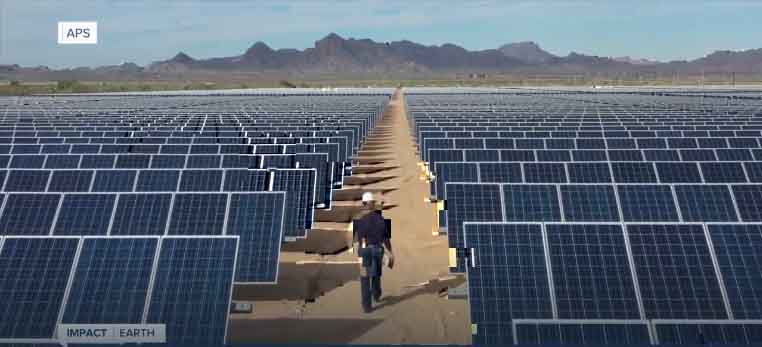 APS has several large photovoltaic (PV) systems in the desert outside Gila Bend, Arizona. They are now adding energy storage systems to some of these PV systems. There is a good article about these on ABC15.com
APS has several large photovoltaic (PV) systems in the desert outside Gila Bend, Arizona. They are now adding energy storage systems to some of these PV systems. There is a good article about these on ABC15.com
A look inside one of APS' energy storage systems
Arizona Public Service Co. has introduced a Residential Battery Pilot Program, starting October 4, 2021.
The pilot will be available to APS residential customers who install residential battery systems, enroll in a TOU (Time of Use) or TOU-plus-demand service plan and commit to discharging their batteries during on-peak periods. (Note: Rate requirements are waived for customers on grandfathered solar rates.) The pilot will help APS learn about battery performance in a variety of conditions and how batteries may create value for customers through improved management of energy demand at their residence and help reduce stress on the electric grid.
Full Article
Read more: Update- Utility Solar Battery Fire in Arizona (Intro)
SRP
SRP, the Phoenix Zoo and City of Phoenix officials recently unveiled a new Phoenix Zoo solar-covered electric vehicle (EV) charging station. The station provides Zoo patrons with 20 pay-to-charge parking spaces near the zoo’s entrance so Zoo visitors can spend the day knowing they will return to their charged vehicle.
More information on the SRP website
TEP
-

-


December 7, 2021
With the recent upgrades and adjustments to the Tucson Electric Power (TEP) LAT3 13.8 kilovolt circuit in Marana, TEP is pleased to announce that all of the circuits on its local grid now have the capacity to support new residential solar projects sized at 20 kW AC and less.
This means homeowners who wish to install rooftop solar anywhere in the TEP service territory should be able to clear “Screen A” of Arizona’s Distributed Generation Interconnection Rules (DGIRs), allowing them to install systems that export excess energy to the TEP local grid.
As you may be aware, some TEP circuits were previously saturated with DG capacity exceeding levels referenced in the DGIR screening tests. Those tests compare the aggregate DG capacity on each circuit with that circuit’s peak load and minimum daytime load over the previous 12 months.
Since then, TEP has completed extensive hosting capacity studies and has made system improvements to expand capacity on circuits where new interconnection requests previously triggered additional review. All of the TEP circuits now have capacity for the addition of new residential exporting DG systems.
The TEP Energy Programs team will contact customers whose rooftop solar projects were suspended due to circuit saturation to inform them that these restrictions have been addressed and to invite them to submit their application to TEP.
TEP is committed to taking a proactive approach to surveying its system and identifying solutions to be able to accommodate additional growth.
If you have any questions, email TEP at renewables@tep.com.
-

-

6/30/20220
Commissioners approved Tucson Electric Power Company’s (TEP) revised Distributed Generation Interconnection Manual. The creation of these manuals was required following the Commission passing rules dealing with the interconnection of distributed generation facilities. TEP’s manual lays out technical and safety requirements that customers within its service territory must follow when interconnecting a distributed generation system, such as residential and commercial solar projects, to the existing grid. The manual is meant to create a standardization process for customers.
TEP’s manual was initially approved at the Commission’s February 2022 Open Meeting, however, following the passage of AriSEIA proposed amendments at that meeting, a revision to the manual was necessary. After several meetings between AriSEIA, TEP, and ACC Staff, the manual was revised to include information regarding Meter Socket Adapters (MSA), detailing their use for generating facilities. The manual was updated to better preserve the Super-Fast Track and Fast Track designations, allowing for faster review tracks for qualified projects. The revised manual also clarifies study cost fees customers are responsible for prior to beginning any study. TEP’s revised manual does not prematurely require inverters to comply with the IEEE sections that are not yet developed or for which equipment is not yet capable of compliance. Further, the manual modified its requirements around transfer trip infrastructure so as not to be overly burdensome, thereby reducing costs for large installations. Finally, the revised manual includes an additional section that provides a list of scenarios meriting an extension of time.
All documents related to this agenda item can be found in the Corporation Commission’s online docket at https://edocket.azcc.gov and entering docket number E-01933A-20-0116.
Tucson Electric Power (TEP) plans to provide more than 70 percent of its power from wind and solar resources as part of a cleaner energy portfolio that will reduce carbon emissions 80 percent by 2035.
TEP has filed its integrated resource plan (IRP) with the Arizona Corporation Commission, outlining plans for 2.5GW of new solar and wind over the next 15 years and 1.4GW of energy storage capacity as it progressively shutters its coal power stations.
See the TEP Press Release for more information: https://www.tep.com/news/tep-plans-clean-energy-expansion-carbon-reduction/
TEP has upgraded their distribution system and as of December 7, 2021 the following no longer applies. Remaining posted for historical reasons.
TEP customers intending to install a new PV system now need to check that their system can be safely installed and connected to TEP’s grid.
TEP now has service areas that are saturated with PV systems where new PV systems are subject to additional review and requirements under Arizona’s Distributed Generation Interconnection Rules. TEP has prepared DG Saturation Maps showing these areas.
This further described at https://www.tep.com/get-started-with-solar/
This requirement stems from the recent Distributed Generation Interconnection Rules issued by the Arizona Corporation Commission.
Further information is available at:Interconnection of Distributed Generation Facilities
Update: See the related article on tucson.com: New state rules limit rooftop solar systems in some Tucson neighborhoods




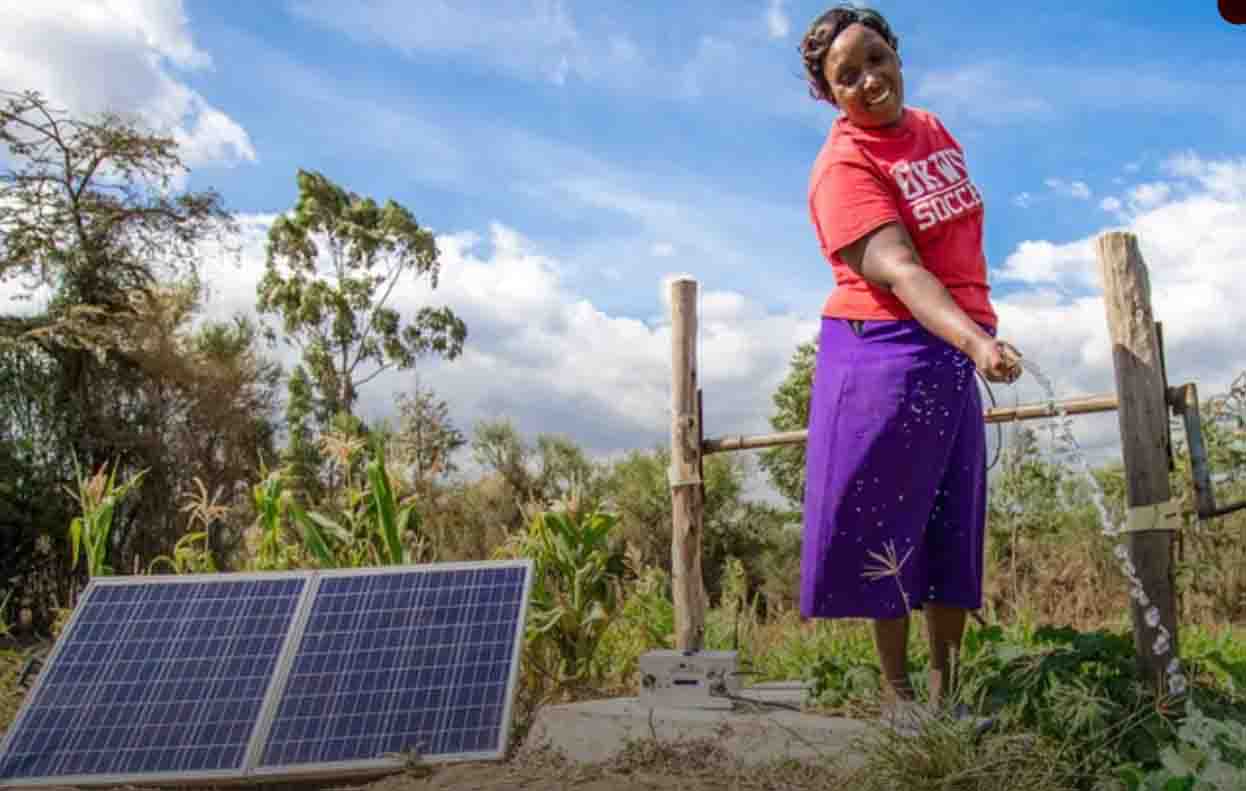

































































 APS has several large photovoltaic (PV) systems in the desert outside Gila Bend, Arizona. They are now adding energy storage systems to some of these PV systems. There is a good article about these on ABC15.com
APS has several large photovoltaic (PV) systems in the desert outside Gila Bend, Arizona. They are now adding energy storage systems to some of these PV systems. There is a good article about these on ABC15.com






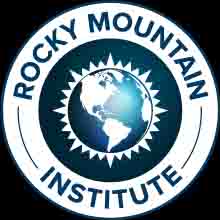 Battery Storage Costs Drop Dramatically, Making Way to a New Era. A recent Rocky Mountain Institute (RMI) report continues to confirm that clean electrification through batteries is advancing at impressive rates. Very interesting report: Breakthrough Batteries- Powering the Era of Clean Electrification
Battery Storage Costs Drop Dramatically, Making Way to a New Era. A recent Rocky Mountain Institute (RMI) report continues to confirm that clean electrification through batteries is advancing at impressive rates. Very interesting report: Breakthrough Batteries- Powering the Era of Clean Electrification 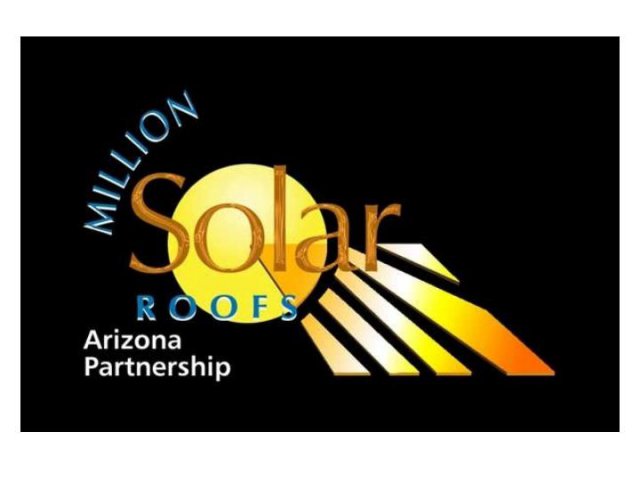
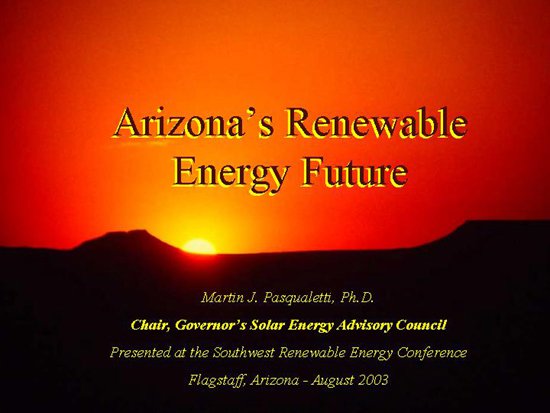
 Arizona Solar Center Mission- The mission of the Arizona Solar Center is to enhance the utilization of renewable energy, educate Arizona's residents on solar technology developments, support commerce and industry in the development of solar and other sustainable technologies and coordinate these efforts throughout the state of Arizona. About the Arizona Solar Center- The Arizona Solar Center (AzSC) provides a broad-based understanding of solar energy, especially as it pertains to Arizona. Registered
Arizona Solar Center Mission- The mission of the Arizona Solar Center is to enhance the utilization of renewable energy, educate Arizona's residents on solar technology developments, support commerce and industry in the development of solar and other sustainable technologies and coordinate these efforts throughout the state of Arizona. About the Arizona Solar Center- The Arizona Solar Center (AzSC) provides a broad-based understanding of solar energy, especially as it pertains to Arizona. Registered